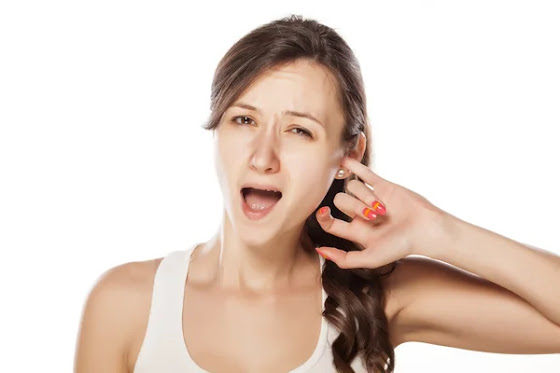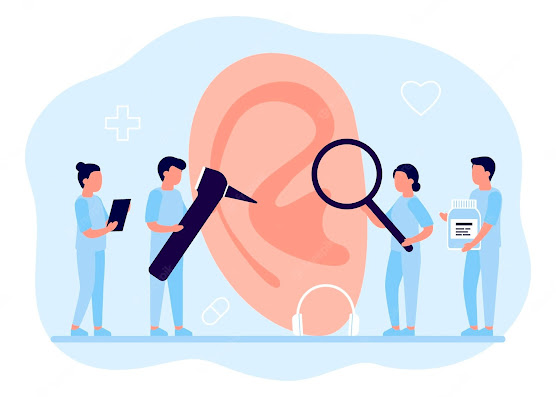Home Remedies to Treat Itchy Ears
Note: Friends, if you are comfortable in reading this article in any other language, please change the language from the translate button on the top of this article.
 |
| Abrasive equipment should never be forcefully inserted into the delicate ear canal as this could result in skin scraping and eardrum ruptures |
Image: Depositphotos
Overview
Having itchy ears is a common problem. A sudden change in the ear canal's environment can cause itchy ears because the human outer ear canal is so sensitive.
The ear canal is innervated with sensitive nerves, making it just as responsive and prone to itching as any other region of the body.
Despite being a frequently reported annoyance, the majority of those who experience ear canal itching frequently feel helpless when coping with this uncomfortable issue.
By scratching their itches with sharp, unsterile objects like bobby pins, toothpicks, and coat hangers, they frequently wind up making the situation worse.
Such abrasive equipment should never be forcefully inserted into the delicate ear canal as this could result in skin scraping and eardrum ruptures.
These will then let bacteria and other foreign materials and debris enter freely and settle deeper into the skin, opening the door for a much more serious illness.
I Can Tell You What I Do To keep my ears clean and itch-free
I do a simple tip to keep my ears clean and away from itching. While taking bath, I bend my head so as to keep my ear towards the floor of the bathroom.
Then I rotate a soapy finger gently in my ear to clean it and then wash and rinse thoroughly.
I do this with both ears and then dry the ears properly using a towel. You can also do this on the wash basin. I do this once a week and I have never faced itching in my ears.
But different people may have different problems and thus different ways of tackling itchy ears.
Causes of Itchy Ears
. Some of the most typical reasons for itchy ears include:
. Reactions to allergens. infected ears
. Inadequate or nonexistent ear wax secretion
. Constant and intrusive ear cleaning with cotton buds to remove any natural wax buildup and prevent the accumulation of dry skin flakes inside the ear canal.
. Accumulation of earwax because frequent use of cleaning instruments tends to push the wax deeper into the ear canal.
. A blockage of water in the ear canal
. The irritation brought on by headphones or hearing aids
. Eczema in the ear canal
. mosquito bites
Itchy ears symptoms and signs
. Drainage or discharge that originates in your ear
. Tenderness or discomfort when touched
. Fever
. Swelling
Some Home Remedies for Treating Itchy Ears at Home:
 |
| If you feel too much itching in your ears, you should consult a doctor |
1. Use Warm Water
. To realign the ear canal, tilt your head up and pull the outer ear up and back.
. A tiny amount of water should be softly injected into the ear canal using the syringe.
. After giving it some time to drain, tilt your head to the opposing side.
. With a clean cloth, wipe away the water and earwax.
On the opposite ear, repeat the procedure.
2. Use Gravity
. Cover your ear with a clean finger.
. Try to establish a vacuum.
. The discharge can be cleaned up with a cotton bud or towel.
. Alternatively, you can just lay on your side with a towel tucked behind your ear.
. Dip a cotton ball into the mixture.
. Squeeze 2-3 drops of this solution into the afflicted ear while tilting it upward and pulling the outer ear up and back.
. After waiting for five minutes, tilt your head in the opposite way while keeping the treated ear down to let gravity work its magic and remove the solution and wax from the ear canal.
. With a tissue, remove the earwax from the outer ear.
. Pull your ear's outer portion gently up and back.
. Use a dropper to apply two or three lukewarm droplets of olive oil to the opening of your ear.
. For five to ten minutes, stay on your side.
. When you sit up, wipe any additional oil that seeps from your ear.
. If necessary, repeat in the other ear.
5. Use Warm Compress
. For five minutes, apply the warm compress to the ear.
. Wash the ear with a soft cleaner.
. For a few days, apply this cure twice each day.
6. Use Hydrogen Peroxide
. With an ear dropper, pour this mixture.
. Put a few drops of this solution in each ear while tilting your head to the side. Hold on to this position for a while.
. After that, turn your head to the opposite side to let the solution drain out.
. Use a clean towel to remove the earwax.
. Do the same with your other ear.
7. Keep Your Ears Dry
. Using a soft towel or cloth, carefully and gently wipe the outside part of your ear to dry it.
. To aid in the drainage of water from your ear canal, tilt your head to one side.
. Put one cotton ball in each of the outer ears while showering to prevent water from entering your ear canals; swimmers' earplugs and a shower cap may also be helpful.
8. You May Use Blow Dryer
. Keep a distance of ten to twelve inches between the blow dryer and your ear.
. Set the air flow to low and the dryer's heat to warm.
. Aim the drier straight at the ear canal after turning it on.
. Keep the dryer in place for around 30 seconds.
. Repeat the process if necessary.
9. Take Care of Your Ears Regularly
. Clean your ears' exteriors on a regular basis with a cotton ball, warm water, and mild soap. Maintaining a clean exterior will help prevent foreign objects and allergens out of your ear canal.
. When swimming, always wear earplugs to keep water and debris out of your ears and lower the possibility of developing an infection in the outer ear canal.
Prevention is better than cure
. If you swim frequently, apply a treatment to remove extra water from the ear.
. Utilize methods prescribed by your doctor to control excessive ear wax production, such as ear drops or a bulb syringe.
. Wear a shower cap while bathing to prevent your ear canal from becoming overly wet.
. Use gentle shampoos and shower gels.
. If you frequently wear earplugs or a hearing aid, be sure to clean them occasionally and insert them gently to avoid irritating your ears.
. Keep your cell phone, glass frames and earbuds clean at all times because they can cause ear infections. People generally never clean their cell phones and glass frames.
. Keep your fingers clean when handling your ears.
When Should You See A Doctor?
Some Additional Tips To Prevent Itchy Ears
. To stop oil, skin cells, and other debris from building up in the opening of the ear canal, only clean the outer ears on a regular basis.
. Avoid inserting foreign things, particularly cotton swabs, in your ears.
. When using items like hair sprays and hair colors, place cotton balls in your ears to protect them from irritants. Make sure not to press them too far.
. If you have dry ears, add moisture to the air in your home with a humidifier.
Questions People Ask on Itchy Ears;
Resources:
- Otorhinolaryngology – Head & Neck Surgery . https://med.uth.edu/orl/online-ear-disease-photo-book/chapter-15-miscellaneous/itchy-ears/.
- Bernstein DI, Teper A, Gopalan G, Gates D. Effects of intranasal mometasone furoate on itchy ear and palate in patients with seasonal allergic rhinitis. Annals of Allergy, Asthma & Immunology. https://www.ncbi.nlm.nih.gov/pubmed/22541408. Published May 2012.
- Kitsoulis P, Marini A, Iliou K. Signs and Symptoms of Temporomandibular Joint Disorders Related to the Degree of Mouth Opening and Hearing Loss. BMC Ear Nose & Throat Disorder. https://www.ncbi.nlm.nih.gov/pmc/articles/PMC3117795/. Published May 25, 2011.
- Rai S. Microbiology of itchy ears. Orontology Online Journal. https://www.semanticscholar.org/paper/Microbiology-of-itchy-ears-Rai/f56a59e9238cf7637bcfea1ce423b7486f945ad8. Published January 2015.
- Saxby C, Williams R, Hickey S. Finding the most effective cerumenolytic. The Journal of Laryngology & Otology. https://www.cambridge.org/core/journals/journal-of-laryngology-and-otology/article/finding-the-most-effective-cerumenolytic/94EA5C9F4BCF30FCFE3F43470A6B102E. Published November 2013.
- Hidir Y, Ulus S, Karahatay S, Satar B. A comparative study on efficiency of middle ear pressure equalization techniques in healthy volunteers. Auris Nasus Larynx. https://www.ncbi.nlm.nih.gov/pubmed/21216116. Published August 2011.
- Rodgers R. Does olive oil prevent earwax build-up? An experimental study. Practice Nursing. https://www.magonlinelibrary.com/doi/abs/10.12968/pnur.2013.24.4.191. Published September 29, 2013.
- Hand C, Harvey I. The effectiveness of topical preparations for the treatment of earwax: a systematic review. British Journal of General Practice. https://www.ncbi.nlm.nih.gov/pmc/articles/PMC1324923/. Published November 1, 2004.
- Otitis externa: Get rid of swimmer’s ear. University of Iowa Hospitals & Clinics. https://uihc.org/health-topics/otitis-externa-get-rid-swimmers-ear. Published June 2017.
- Collier S, Beach M, Brady M. Swimmer’s ear a mild but burdensome illness. AAP Gateway. http://www.aappublications.org/content/32/6/1.2. Published June 1, 2011.
- Stenfors LE, Henriksen AO. Treatment of earache among the Lappish people. The Journal of Laryngology & Otology. https://www.ncbi.nlm.nih.gov/pubmed/2324615.
- Conductive Hearing Loss. ENT Health. https://www.enthealth.org/conditions/conductive-hearing-loss/.
Visit our Facebook Page: https://www.facebook.com/Indian-Nuskhe-252444405114061
For disclaimer and terms of use of our blogs please click here

Comments
Post a Comment